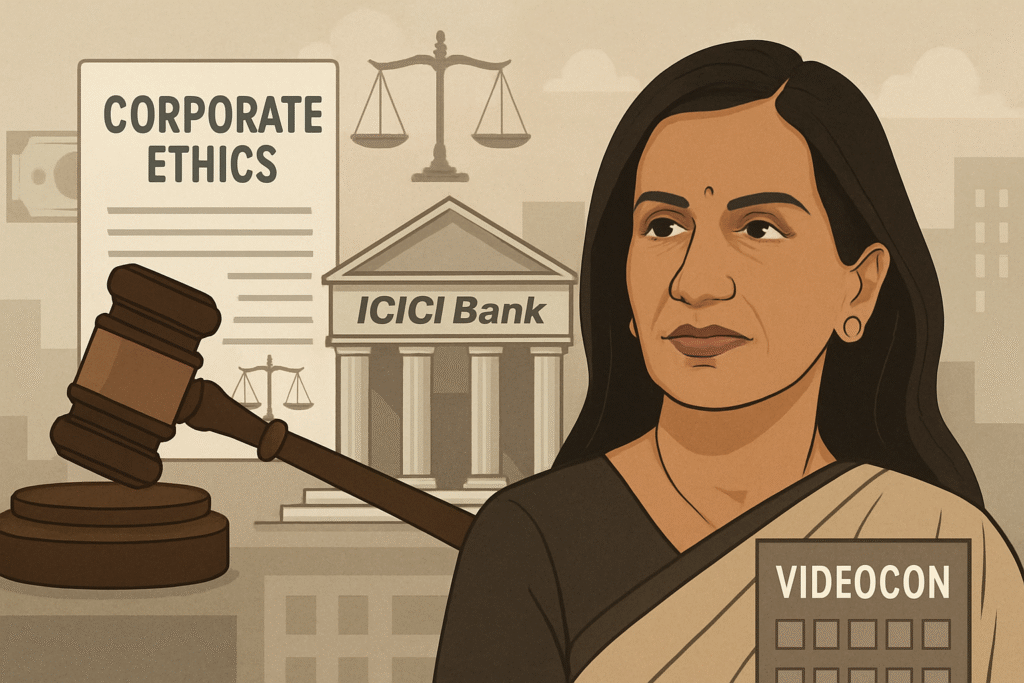The Chanda Kochhar Case: A Landmark Verdict on Corporate Ethics and the Law


The Indian financial world has witnessed some dramatic moments, but few scandals have gripped the nation quite like the ICICI Bank-Videocon saga, centered around its former CEO and MD, Chanda Kochhar. The most recent and decisive development—a tribunal’s ruling finding Kochhar guilty of accepting a ₹64 crore bribe—has far-reaching implications for both banking ethics and the standards of corporate governance in India.
Let’s break down what happened, why it matters, and the legal provisions at the heart of the controversy.
The Heart of the Scandal: What Happened?
In plain speak, the Enforcement Directorate (ED) and the Central Bureau of Investigation (CBI) uncovered a “clear case of quid pro quo”:
- ICICI Bank, under Chanda Kochhar’s leadership, sanctioned a ₹300 crore loan to the Videocon Group.
- Barely a day later, ₹64 crore was routed from Videocon to NuPower Renewables, a company controlled by Chanda’s husband, Deepak Kochhar.
- The claim that this was a fair-market business transaction was dismissed by a tribunal, which labeled it a bribe camouflaged as investment.
Here’s why this case stands out: the alleged bribe was not handed over in a suitcase, but funneled through corporate structures—illustrating the sophisticated, often subtle face of modern financial malfeasance.
Why Is This Such a Big Deal?
At first glance, the story seems like another tale of corporate greed. But dig deeper and the ruling isn’t just about a loan gone wrong. It’s about accountability at the highest rungs of India’s banking sector.
- Proceeds of Crime: The property and investments acquired, mainly a posh Mumbai flat and shares worth up to ₹78 crore, were declared as “proceeds of crime” and their attachment was upheld under the Prevention of Money Laundering Act (PMLA).
- Breach of Trust: At the core is the sacred trust between banks and their customers—one that is built on transparency, ethics, and disclosure. The case exposed how that trust can be shattered from the very top.
Laws at Stake: Major Provisions Violated
To help you understand what makes this verdict so significant, here’s a look at the key legal provisions implicated:
1. Prevention of Money Laundering Act, 2002 (PMLA)
- Section 3: Defines the offence of money laundering, wherein any action involving the proceeds of crime—concealment, possession, acquisition, or use—is punishable.
- Section 4: Specifies the penalty for money laundering, including rigorous imprisonment and fines.
- Section 5 & 8: Empower authorities to provisionally attach and then confirm seizure of properties suspected to be proceeds of crime. In this case, the Mumbai flat and related investments were attached and their release was overturned by the tribunal.
2. Prevention of Corruption Act, 1988
- Section 7 & 13: Penalizes public servants for accepting illegal gratification and criminal misconduct by obtaining pecuniary benefits through abuse of position.
- The case is seen as a textbook “quid pro quo”—loan sanction in return for personal benefits routed to family members.
3. ICICI Bank’s Own Internal Code and Banking Norms
- Senior executives are required to disclose any conflicts of interest and recuse themselves from decisions where personal connections exist. The tribunal found Chanda Kochhar failed to make these mandatory disclosures, breaching not just the law but also corporate ethics.
How Did the Tribunal Respond?
The appellate tribunal, in its stinging July 3, 2025 verdict, left no room for ambiguity:
- It called out the previous lower authority for turning a blind eye to “smoking gun” facts.
- It confirmed that Deepak Kochhar “effectively controlled” NuPower, and Videocon’s Venugopal Dhoot was merely a front.
- Most importantly, it validated the investigative agencies’ version—that there was a direct, provable chain connecting the loan approval, transfer of funds, and personal gain.
What Happens Next?
Currently, there are no public reports of further legal action or appeals by Chanda Kochhar against this most recent order. The Supreme Court remains seized of certain procedural matters, including CBI appeals related to bail and potential lapses in earlier investigations.
But in the eyes of the law, and the public, a precedent is set: transparency, disclosure, and ethical conduct are non-negotiable—even at the highest levels of India’s financial sector.
Why This Verdict Matters to You
Whether you’re an industry insider or a customer, the ruling drives home these critical messages:
- Banks don’t just manage money—they safeguard your trust. That trust cannot be sacrificed for personal gain.
- Regulations like PMLA and the Prevention of Corruption Act are not just legal hurdles; they are pillars meant to ensure accountability and protect the broader public good.
- The need for robust internal governance structures and whistleblower-friendly environments has never been clearer.
In Conclusion
While the details of the Chanda Kochhar–ICICI Bank–Videocon case are as complex as any modern financial thriller, the lessons are refreshingly simple. Ethics matter. The law matters. And when the two are violated at the top, the entire system feels the shockwaves.
As India’s financial sector moves forward, let’s hope this case serves not just as a cautionary tale, but as a powerful call for greater scrutiny, accountability, and integrity in business.
Suggested Readings
- Chanda Kochhar Videocon case: ED order upheld; ‘prima facie’ case of money laundering against ex ICICI Bank CEO, MD – BusinessToday
- Chanda Kochhar-Videocon Scam: Inside The Rs 3,250 Cr Loan And Rs 64 Cr Bribery | Banking and Finance News – News18
- Chanda Kochhar case: Appellate Tribunal upholds ED’s money laundering charge in case involving Rs 64 cr bribe, Churchgate flat | Business News – The Indian Express
- Chanda Kochhar found guilty in Rs 64-crore Videocon bribe case: Report – India Today
- Ex-ICICI Bank CEO Chanda Kochhar found guilty of accepting ₹64 crore bribery – Hindustan Times